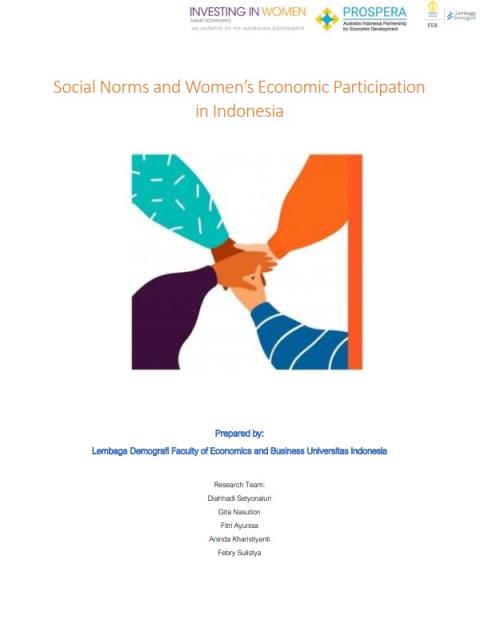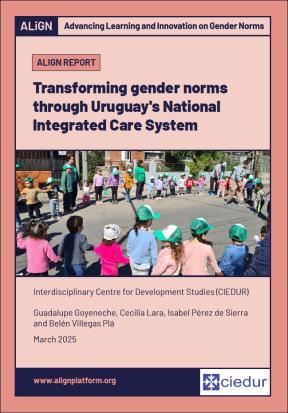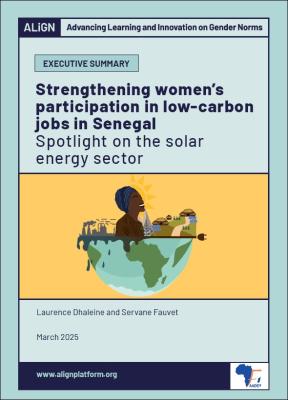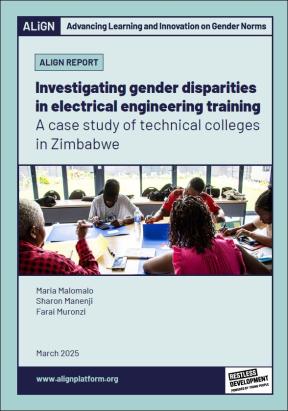- Report
- 1 August 2021
Social norms and women’s economic participation in Indonesia
- Published by: Investing in Women

In May 2021, Investing in Women, in partnership with Prospera, completed research with Lembaga Demografi at the University of Indonesia to investigate gendered social norms and their impact on women’s economic participation in Indonesia, with a particular focus on the impact of COVID-19.
Qualitative research undertaken through the study found that gendered roles within a household shape women’s and men’s perception about their work outside the home, and that the gendered child caring role is the main factor that determines women’s decision to work and their preferences towards work.
Economic pressures, such as those arising from COVID-19, prompt women and men to negotiate gendered roles at home. Although such pressures provide an opportunity to negotiate women’s working role, this still needed to be done within the context of the perception that women are the primary providers of childcare. Job choices, therefore, are driven by flexibility.
The study also found that social and gender norms persist during the pandemic, including on gender division of roles in the household. While men perform a supportive domestic role, their role is lighter, and irregular compared to women. Most women remain responsible for major household work, while men are undertaking complementary tasks.
This research provides IW with insights on the opportunity that arises in crises for women to negotiate and leverage shifts in norms, as well as highlights the risks of additional pressures for women during crises, and for gains that are only temporary.
Highlights
- Men are doing more housework, but most of the unpaid care work is shouldered by women.
- More than 55% of male age 18-40 did domestic work in 2019 and increased to 68% in 2020
- Women continue bear the brunt of the unpaid care work, with more than 90% of female aged 18-40 doing domestic work.
- Social norms at home may evolve, but it may not change the attitudes and behaviour towards women’s employment decisions.
- The majority of women who quit cited childbearing and domestic duty
- Gendered social norms persist: women are better carers, men are the primary breadwinners. This view was shared by the majority of young adults participating in the study.
- The view of “women as a better carer” is internalised and childcaring remains the main reason for women’s aspiration to work from home. The view of “men as breadwinners” positions men to keep playing a supportive role towards women’s domestic role in the household.
- Male and female millennials refer to their internalised norms at home (inherited mostly from parents) and at work, as a reference to women’s employment decision rather than structural factors at workplace. These views are also shaped by religion and the perception that’s women’s natural place is at home.
- Women’s work outside the house is secondary, and when they do work, the type of employment or work conditions must be flexible enough to enable them to perform their perceived primary caring role at home.
- The norms at work revolves around the norms at home that idealise women’s caring role and gender stereotypes.
- Administrative jobs are therefore perceived as more suitable for women while physical & technical jobs are for men. This bias preference creates an ‘acceptance’ that it is ideal for men to have a higher salary than women
- There is support for women’s leadership within this paradigm; most of the respondents are positive about women being a leader at work particularly because women are seen to be more caring.
- Work choices and the way women negotiate these vary as they are also affected by socio-economic conditions of individuals and families.
- Women negotiated their role inside and outside the house during the pandemic, depending on their resources.
For more resources on influencing gender norms, visit the Investing in Women Knowledge Hub.
- Countries / Regions:
- Indonesia
Related resources
Report
26 March 2025

Report
20 March 2025

Report
20 March 2025
